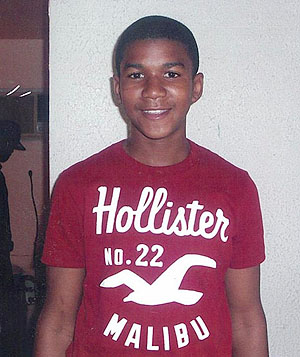Yesterday, referring to the Trayvon Martin case, I asked whether “wrestling someone to the ground and throwing some punches” was enough to count as a reasonable fear of great bodily harm, the standard in Florida for defending yourself with lethal force. Today, a reader sent me a link to a Sunday piece in the Tampa Bay Times, and the answer sure seems to be yes. The detailed tick-tock of exactly who did what that night is  interesting in the court of public opinion, but apparently it matters not a whit as far as the law is concerned:
interesting in the court of public opinion, but apparently it matters not a whit as far as the law is concerned:
“The real issue is what happens around the 60 seconds prior to the shooting,” said Ed Griffith, a spokesman for the Miami-Dade State Attorney’s Office, which brought the charges against Greyston Garcia. “Everything else has emotional content, but from a legal perspective, it all comes down to the 60 seconds before the incident.”
It doesn’t matter if you’re the one who initiated the confrontation. It doesn’t matter where you are, as long as you have a right to be there. It doesn’t even matter if you shoot someone who’s fleeing. All that seems to matter is whether you have any kind of plausible claim to have feared great bodily harm. Here’s a recent case:
Nine days after Trayvon Martin was shot dead in Sanford, Brandon Baker, 30, and his twin brother were driving separate cars toward the apartment they shared in Palm Harbor. Seth Browning, a 23-year-old security guard who later told deputies he was concerned with Baker’s erratic driving, pulled in close behind Baker to get his license tag number.
Baker turned off East Lake Road, then onto an access road and came to a stop….Browning followed and stopped….Baker climbed out of his truck and walked to Browning’s window. His brother [] said Baker was trying to figure out why Browning was tailgating him…..Browning sprayed Baker with pepper spray, then shot him in the chest. He told deputies that Baker had punched him and he was in fear for his life.
….More than 500 people have signed their online petition to get “stand your ground” repealed. “This case is being considered a ‘stand your ground’ case and should not be since Seth Browning was the sole ‘AGGRESSOR’ and ‘CHOSE’ to tailgate, pull over, pepper spray, and shoot and kill Brandon Baker,” it says. “Seth Browning did NOT act out of self defense and should be prosecuted for killing Brandon Baker.”
But if history serves, the pursuit may not matter. The case will hinge on what happened in the moments before Browning pulled the trigger, and whether he feared for his life. Pinellas Sheriff Bob Gaultieri said this week that the case is still under investigation.
The whole story is fascinating and well worth a read. And while I’m no lawyer, it certainly seems to suggest that if George Zimmerman ever goes to trial, prosecutors will have a tough time winning a conviction.
UPDATE: In the third paragraph I originally said, “It doesn’t matter if you’re the one who started the fight.” That was sloppy. The story itself suggests that it doesn’t matter who “initiated the confrontation.” That’s legally a different thing. I’ve corrected the text.

















